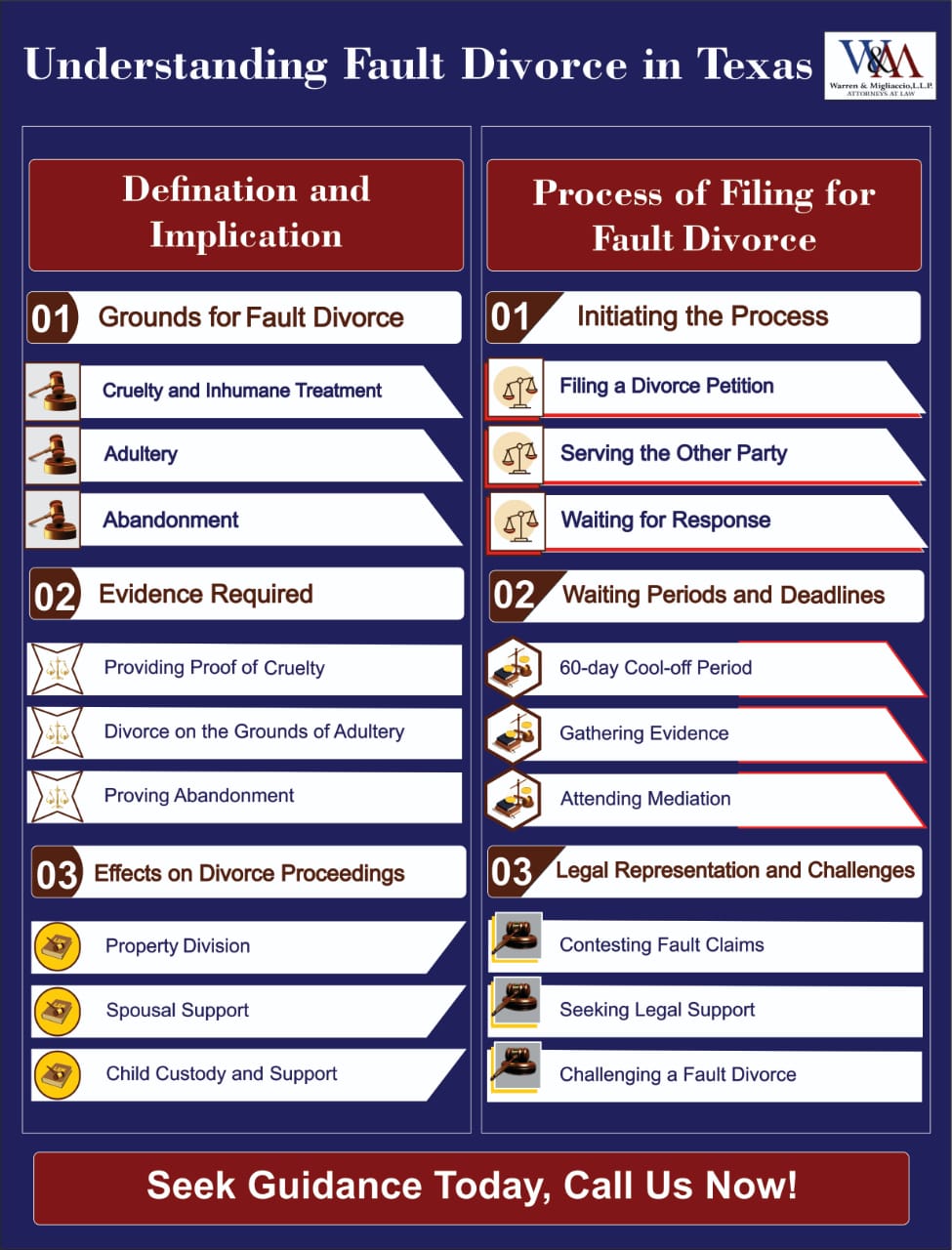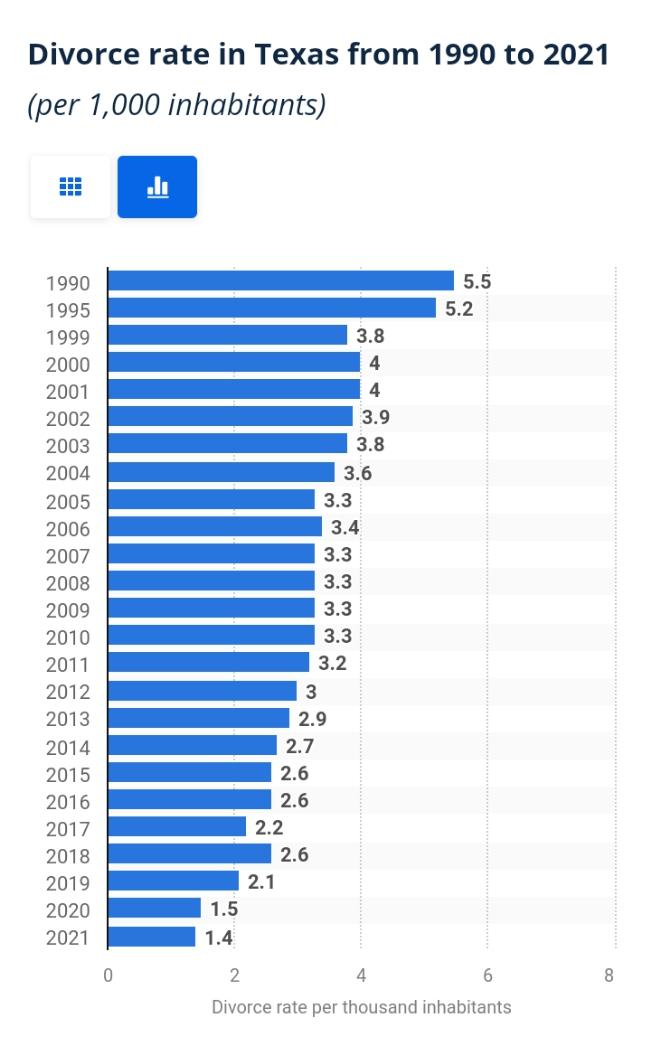If you are contemplating a Texas divorce and unsure about the effects of fault on dissolving your marriage, we are here to help. Fault and no fault divorce are different and require specific attributes. Unlike a no fault divorce, where parties may not need to provide a reason for their separation, divorce with fault involves one party alleging and demonstrating that the other’s misconduct is responsible for the marriage breakdown.
Fault can affect many aspects of the divorce law, and it is advantageous to know how beforehand. Let’s see how being at fault in a divorce might affect such factors as spousal support, marital property division and child custody, among other parameters.
Definition of Fault Divorce in Texas
In Texas, fault in divorce is a dissolution of marriage where one spouse cites specific reasons for the breakup as listed under the Texas Family Code. The grounds for a fault-based divorce go beyond irreconcilable differences and must be substantiated with evidence during the divorce proceedings. This can be difficult for some and add to the emotional difficulties inherent in the divorce process.

Grounds for Fault Divorce
In Texas, the grounds for a fault divorce, which include legal proceedings and evidence to provide proof, are:

- Cruelty and Inhumane Treatment: This includes any physical or emotional abuse that makes it impossible to continue living together as a married couple.
- Adultery: An affair that occurs with another person outside of the marriage can be a reason for filing a fault divorce. This can include dating while going through divorce. Learn about the legal impacts of an infidelity divorce in Texas.
- Abandonment: If one spouse leaves the other intending to abandon them, the abandoned partner may initiate divorce proceedings. In such cases, the spouse must have departed for a period of one year.
- Felony Conviction: If a spouse serves time for a felony conviction and remains imprisoned for at least one year, the other spouse has the right to file for divorce. This can be imprisonment in a Texas penitentiary or that of another state. However, if the spouse’s conviction was based on the testimony of the other marital partner, a divorce is not granted under this section.
- Living Apart: Couples who have lived separately without cohabitation for at least three years can file for a fault divorce. Separation can occur for a variety of reasons. If spouses have been living separately for at least one year, they may file for divorce by mutual consent without having to prove fault.
- Confinement in a Mental Hospital: A divorce may be sought if one spouse remains confined in a state mental hospital for at least three years at the time of filing. To file requires that the spouse’s condition is of such a degree that it is unlikely that improvement will occur, and if it does, a relapse is likely.
Evidence Needed to Prove Fault Divorce in Texas
It is necessary to provide evidence in a Texas divorce in order to prove fault. You can get assistance from your family law attorney to gather the required documentation and advise you on what is needed for a successful outcome.

Providing Proof of Cruelty and Inhumane Treatment
In cases of cruelty and inhumane treatment, the petitioner must demonstrate that the spouse’s behavior was so severe it rendered further living together insupportable. Evidence can include documented instances of physical or emotional abuse, police reports, or testimony from witnesses who observed the behavior.
Divorce on the Grounds of Adultery
Adultery, another ground for fault divorce in Texas, requires proof of extramarital affairs. This may involve presenting evidence such as photographs, videos, correspondence, or an admission of infidelity by the cheating spouse. A spouse seeking divorce on the grounds of adultery may require the assistance of a private investigator to gather this evidence.
Proving Abandonment
Abandonment involves a spouse willfully leaving the petitioner with the intention of abandonment and staying away for at least one year. Evidence can include testimony from the petitioner or other witnesses and documentation proving the absence.

Documentation for Felony Convictions
The spouse must show a conviction record proving that a court convicted him or her of a felony, he or she has served at least one year in a federal or state prison, and has not received a pardon
Separation as Grounds for Divorce and Providing Proof
Living apart or separation constitutes grounds for divorce in Texas if the parties have not cohabited for at least three years. The evidence for this is typically straightforward: documentation or testimonies confirming that the spouses have maintained separate residences for the required period.
Providing Proof of Hospital Confinement for a Mental Condition
To establish confinement in a mental hospital, you must show that the spouse has been confined in a state or private mental hospital for at least three years before filing for divorce. The spouse must also be suffering from a mental disorder so severe or complex that adjustment is unlikely or a relapse is probable. Usually, you need medical records and expert testimony to establish this ground.

Can Divorce Proceedings Be Affected by Fault?
Yes, various factors in the divorce proceeding can affect the judge or jury’s decision, for instance:
- Property division: The final outcome of how the couple’s property is divided can be affected by a spouse’s fault. For example, the court may consider at-fault behavior negatively when dividing community property, potentially awarding a larger portion to the non-fault party.
- Spousal support: In Texas, spousal support (also known as alimony) is not automatically granted in divorce proceedings. Still, evidence of fault can influence whether it will be awarded and the amount. For example, a spouse found guilty of adultery may receive less financial support from the other party. Additionally, certain grounds for fault divorce, such as abandonment or confinement in a mental hospital, may also impact spousal support.
- Child custody and support: A family court judge decides what is in the child’s best interests. The presence of fault may affect the judge’s decision. If a spouse is unable to provide for the child due to a felony conviction and imprisonment, the court is more likely to deny primary custody or parenting time. Alternatively, the court might lessen the amount of child support. A history of domestic violence might also affect child custody, making it less likely for the parent to receive custody or unsupervised visitation.
The Process of Filing for a Fault Divorce in Texas
Timelines and deadlines play a crucial role throughout this process, and the assistance of a seasoned divorce attorney is often invaluable.
The steps to initiate a fault divorce in Texas include:

- Filing a divorce petition that specifies the fault grounds. The petition must be filed in the county where either spouse resides for 90 days before filing. If the spouse filing for divorce does not reside in Texas but their partner has for the past six months, the non-domiciliary spouse may file.
- Serving a copy of the divorce paperwork to the other party and allowing them time to respond. The divorce form must be delivered in a way that assures all parties received it. This requires that the server is at least 18 years old, a process server or constable or by certified mail. It is also possible to e-file the petition. It is possible to include a Waiver of Service. In this case, the other party merely has to sign the document, have it notarized and file it with the court.
- Waiting for their spouse to respond to the Texas divorce papers within the 20 to 28-day period. This would be by 10:00 a.m. on the Monday after 20 days have expired since they were served.
- A 60-day cool-off period must pass after filing before rendering a final decree of divorce. This waiting period allows the spouse time to consider the divorce before finalization.. It also gives both parties a chance to prepare properly. There are two times when the 60-day period does not occur. The reasons center on domestic abuse.
- Gathering evidence to prove the fault grounds. This may include witness testimony, documentation, or other supporting materials. This is called the discovery phase of the divorce.
- Attending mediation, if required by the court, to attempt to reach a settlement or resolve issues.
- Proceeding to trial if necessary to present evidence and receive the court’s final judgment.
- If either spouse wishes to remarry, they must wait 31 days in Texas after the Texas final decree of divorce. However, if they are remarrying each other, this waiting period not not exist.
Challenging a Fault Divorce With Legal Representation
The accused party has the right to contest the fault claims, necessitating understanding specific legal procedures to challenge the grounds and the burden of proof.

If you’re considering a fault divorce in Texas, seek legal support. An experienced divorce attorney is essential. They can guide you and advocate for you. No matter the challenges during proceedings, a knowledgeable attorney helps. This can make all the difference in achieving a favorable outcome. So don’t hesitate to reach out for legal support.
Take Next Steps WithWarren & Migliaccio, L.L.P.
Our law office has assisted many clients in Texas in reaching a fair divorce settlement. Our duty is to protect our clients and offer compassionate service through this difficult time. You can reach a divorce lawyer at (888) 584-9614 and schedule a free case evaluation where we answer your questions and provide the legal help you need.
